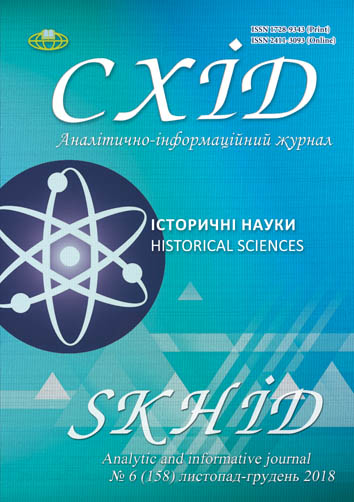National security issues in software documents of political parties on elections to supreme council of Ukraine in 2014-th in the conditions of Russian agriculture
DOI:
https://doi.org/10.21847/1728-9343.2018.6(158).154958Keywords:
political parties, elections, Ukrainian Armed Forces, aggression against UkraineAbstract
The article deals with the election programs of political parties that participated in the elections to the Verkhovna Rada of Ukraine in 2014. The place of the problem of national security of Ukraine in the program documents of party-parties in the conditions of Russian military aggression was investigated. It was found that the Ukrainian politician reacted differently to the presence of the Russian threat, which was expressed in the election programs of political forces. Political forces, which were considered «pro-Russian» in their programs, actually avoided references to the problems of national security and the need to repel the aggressor. The parties and political blocs that, as a result of historical circumstances, were perceived as «parties of power», pointed to the need for the formation of a combat-capable military force, the development of the military-industrial complex and the establishment of close cooperation with the NATO and EU states. A number of political forces demanded a decisive rebuff of the RF and the dissolution of any relations with it. A number of parties raised the problem of corruption in the army and, in the context of strengthening the defense capabilities of the state, demanded lustration among law enforcers. It was clarified that the «parties of power» and political forces whose participants were in the zone of combat operations in the Donbas not only clearly defined the Russian Federation as an aggressor state, but also offered detailed steps, the application of which, in their opinion, had little to contribute to the provision of repulsion of the aggressor. The analysis of the election programs of the parties of the 2014 elections allowed us to conclude that the factor of Russian aggression forced the Ukrainian politician to reconsider its attitude to the problem of national security in the direction of the need to strengthen the Armed Forces of Ukraine to counter military incursions by the Russian Federation.Downloads
References
Gorbulin, V.P. 2017a. National security is a priority of such an important state. Bulletin of the National Academy of Sciences of Ukraine. 1: 25-29. Available at: http://dspace.nbuv.gov.ua/bitstream/handle/123456789/114403/05-Horbulin.pdf?sequence=1
Gorbulin, V.P. (ed.) 2017b. Svitova gіbridna vіyna: Ukrainian Front. NISD Publishing, Kyiv, 496 p. (ukr).
Levyk, B. 2012. Military and political security of the armed forces of Ukrainein 1991-1992 (archival material of State branch archives of the Ministry of Defence of Ukraine). Skhid, no. 3(117): 96-101. Available at: http://skhid.kubg.edu.ua/article/view/16476.
Levyk, B. 2016. Change of the geopolitical choice of independent Ukraine(current historical aspect). Skhid, no. 4(144): 57-61. DOI: https://doi.org/10.21847/1728-9343.2016.4(144).77988.
Levyk, B. 2014. Concept of Balto-BlackSeaUnion and Post-SovietTerritory. Skhid, no. 5(131). DOI: https://doi.org/10.21847/1728-9343.2014.5(131).29428
Magda, Ye.V. 2016a. Hybrid aggression of Russiain Ukraine: lessons for Europe. Studia humanistyczno-społeczne. № 2: 85-95. DOI: https://doi.org/10.17951/we.2016.2.2.85
Magda, Ye. V. 2016b. Zagrozi gribridoji vіyni for European Europe Integration of Ukraine. Strategic panorama. No. 1: 61-65.
Perepelitsa, G.M. (comp., ed.)2002. Parliamentary control over the building forces: European countries (Text). National Strategic Investigation Center under the Administrative Board of the President of Ukraine, Geneva Center for Democratic Control over the Strength of Power (Switzerland). Kyiv: Stilos, 2002. 552 p. (ukr).
Downloads
Published
How to Cite
Issue
Section
License
Copyright (c) 2019 Andriy Tkachuk

This work is licensed under a Creative Commons Attribution-NonCommercial-NoDerivatives 4.0 International License.
1. Authors bear responsibility for the accuracy of facts, quotations, numbers and names used.
2. Manuscripts are not sent back.
3. The publisher does not always agree with the authors' opinion.
4. The authors reserve the right to authorship of the work and pass the first publication right of this work to the journal under the terms of a Creative Commons Attribution-NonCommercial-NoDerivatives 4.0 International License. This license allows others to distribute (copy) the published work for non-commercial purposes, provided there is mandatory attribution to its authors and a link to the first publication in our journal.
5. The authors have the right to conclude separate supplement agreements that relate to non-exclusive work distribution in the form in which it has been published by the journal (for example, to upload the work to the online storage of the journal or publish it as part of a monograph), provided that the reference to the first publication of the work in this journal is included.

